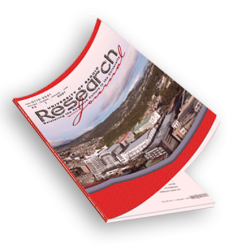UB RESEARCH JOURNAL
Authorship
The determination of authorship shall follow the ethical standards set by the Committee on Publication Ethics (COPE). Authorship credit must be based on the fulfillment of all the following criteria:
Criterion 1: Substantial intellectual contribution to the research work. An individual may make a substantial intellectual contribution in several different ways, including:
- Substantial Contributions. . Each author must have made meaningful contributions to the Conception and design (e.g., formulation of hypotheses, refining research ideas, development of study objectives; or the definition of experimental, statistical, modeling, or analytical approaches). Contributions may also include the development of new tools, methods, or software integral to the study.
- Intellectual Input: Authors should have been involved in drafting the manuscript or in revising it critically for important intellectual content. This includes both original content creation and significant, thoughtful revisions that shape the manuscript’s final form.
- Acquisition of data or development of models (e.g., non- routine fieldwork, such as adapting or developing new techniques or equipment necessary to collect essential data; non-routine lab work such as development of new methods or significant modification to existing methods essential to the research; literature searches; theoretical calculations; and development and application of modeling specific to the project), or
- Analysis and or interpretation of data.
Criterion 2: Provided significant input in critiquing the research work for important intellectual content.
- Intellectual Input. Authors should have been involved in drafting the manuscript or in revising it critically for important intellectual content. This includes both original content creation and significant, thoughtful revisions that shape the manuscript’s final form.
Criterion 3: Approval of the final version to be published and agreed to be accountable for all aspects of the research work. This approval signifies their endorsement of the entire content and their agreement with its submission and publication.
- Responsibility. All authors must accept public responsibility for appropriate portions of the content. They should be willing and able to address any concerns related to the accuracy or integrity of the work and ensure that such concerns are adequately resolved.
Only individuals who meet all the above criteria should be listed as authors.
- Any individual who has not met the three criteria, independent of their rank, status, or affiliation, should not be named as an author.
- Authorship should not be offered as honorary authorship, pseudo-authorship, surprise authorship or ghost authorship.
- Individual who do not fulfill all these criteria should be acknowledged in the Acknowledgment section of the manuscript. Other collaborators may be recognized in the acknowledgments section, especially when their involvement is limited to general supervision, funding acquisition, or data gathering.
- Contributions worthy of acknowledgment can include literature searching, contract or project management, supervision, mentorship, statistical consultation, manuscript review, advice, provision of materials or space, routine assistance, financial support, and grammatical or stylistic editing. Individuals listed in the acknowledgments section should be notified before final publication of the work product.
- An individual acknowledged or listed as an author may remove his/her own name from a work or voluntarily withdraw the work if they he/she is the sole author. But an author should not be compelled to remove his/her name or withdraw the work product unless doing so is necessary to comply with the authorship policy.
- The co-authorship is not meant as a substitute or replace faculty members and academic services faculty from pursuing their own original and individual research. In addition, this cannot be used to fill up or complete the required basic teaching load of faculty members.
All listed authors should be able to identify their specific contributions and those of their co-authors. Additionally, each author must trust in the integrity of the entire work and the accuracy of their co-authors’ contributions. All listed authors should be able to identify their specific contributions and those of their co-authors. Additionally, each author must trust in the integrity of the entire work and the accuracy of their co-authors’ contributions.
The corresponding author, especially in cases of multiple authors, must be clearly identified. This individual will handle all communications with the editor and readers, and shall ensure that all administrative requirements are fulfilled.
For studies conducted by a multicenter or collaborative group, the group must designate who will take full responsibility for the work. Upon submission, the preferred citation should be stated, along with a list of all contributing authors and the group name.

Publication Ethics
All authors are expected to adhere to the highest standards of publication ethics, as prescribed by the Committee on Publication Ethics (COPE). Any form of academic misconduct, including but not limited to data fabrication or falsification, plagiarism (including self-plagiarism without appropriate acknowledgment), and the unauthorized use or misappropriation of another individual’s work, is deemed unacceptable. Allegations or instances of ethical violations shall be treated with the utmost seriousness and will be addressed in accordance with the established COPE guidelines to preserve the integrity and credibility of the scholarly record.
ORCID ID
The University of Baguio supports the use of Open Researcher and Contributor Identifier (ORCID) and mandates that the corresponding author provide an ORCID iD upon manuscript submission. We strongly encourage co-authors to register for ORCID and link their ORCID iDs to the submission. The ORCID iD of the corresponding author, along with those provided by co-authors, will be published.
SIMILARITY CHECK
Authors may also utilize the Turnitin Draft Coach to check their manuscript for similarity. This tool is available in Google Docs under the ‘Add-Ons’ tab. To access it, please log in using your UB Mail credentials. For more information
Contact Us
- [email protected]
- [email protected]
- (074) 442-3036
- 77 General Luna Road, Baguio City Philippines 2600
